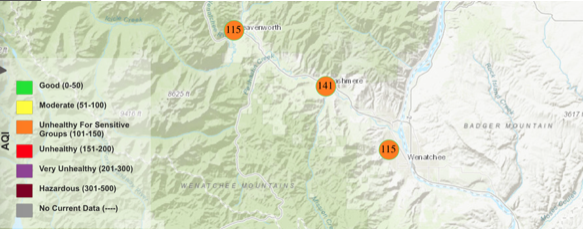As a devoted pet owner, safeguarding the well-being of your furry companions is of utmost importance. With the rising occurrence of wildfires and deteriorating air quality, understanding the impact of smoke-filled air on your pets and knowing how to protect them is essential. In this blog, we will delve into the significance of air quality for pets, sharing insights from the National Weather Service (NWS) in Washington State, and providing actionable steps to ensure your four-legged friends remain safe during periods of poor air quality.
The Threat of Poor Air Quality:
Wildfires produce copious amounts of smoke, containing harmful particles and pollutants that can adversely affect both humans and animals’ respiratory systems. Washington state, according to data from the National Weather Service, has witnessed a concerning surge in the frequency and severity of wildfires, leading to compromised air quality levels.
Statistics from the NWS:
– Over the past decade, Washington state has experienced an annual average of 900 wildfires, resulting in significant smoke emissions.
– Air quality index (AQI) readings in affected regions have often risen beyond the “unhealthy” category, frequently exceeding 100 AQI during peak fire seasons.
– Due to their smaller lung capacity and faster respiratory rates compared to humans, pets can be more susceptible to the adverse effects of smoke particles in the air.
Protecting Your Pets During Poor Air Quality:
1. Stay Informed: Stay updated on local air quality reports and forecasts. The NWS offers real-time AQI updates, aiding in planning your pets’ outdoor activities.
2. Limit Outdoor Exposure: Reduce your pets’ time outdoors during periods of poor air quality. Engage them in indoor activities, mental stimulation, and interactive play to keep them active and entertained.
3. Create a Safe Indoor Haven: Ensure your home provides a refuge from smoke-filled air. Keep windows and doors closed and employ air purifiers featuring HEPA filters to reduce indoor pollutants.
4. Hydration is Key: Smoke and pollutants can lead to increased dehydration risk. Ensure your pets have access to fresh, clean water to stay properly hydrated.
5. Consult Your Vet: If your pets have pre-existing respiratory conditions, consult your veterinarian for tailored guidance on managing their health during poor air quality.
6. Monitor Respiratory Signs: Be watchful for signs of respiratory distress, such as coughing, wheezing, or labored breathing. If these symptoms arise, seek prompt veterinary care.
In the face of escalating wildfires and compromised air quality, safeguarding your pets’ health is a vital responsibility. By remaining informed, taking proactive measures, and prioritizing their comfort, you can ensure that your cherished pets remain safe even amid unfavorable air quality conditions. Remember, small efforts on your part can make a significant difference in preserving your pets’ well-being.


